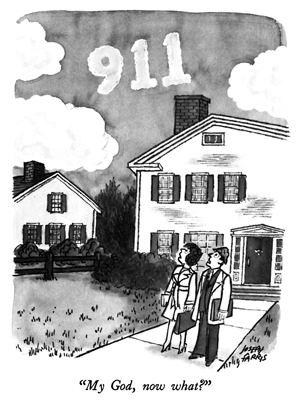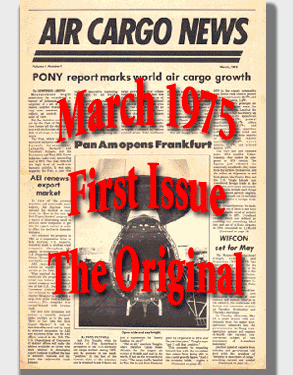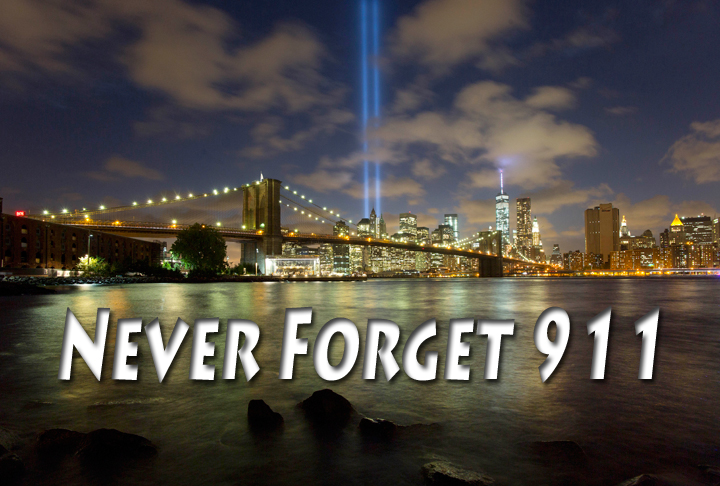
The Tribute in Light rises
behind the Brooklyn Bridge and buildings adjacent to the World Trade Center
complex late Wednesday, Sept. 10, 2014, in New York. The tribute, an art
installation of 88 searchlights aimed skyward in two columns, is an annual
remembrance of the September 11, 2001, attacks that destroyed the twin
towers after 19 men hijacked four fuel-loaded commercial airplanes bound
for west coast destinations.
A total of 2,977 people were killed in New
York City, Washington, DC, and outside of Shanksville, Pennsylvania, in
the worst terrorist attack in U.S. history, orchestrated by al Qaeda leader
Osama bin Laden.
Also in the picture, the jewel-like pinnacle
of the new World Trade Center towers above everything, lighting up the
night at an historically significant 1,776 feet.
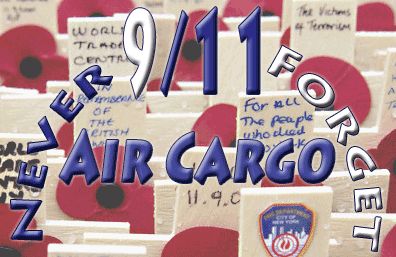 This
series of comments are part of many that were written for the 10th anniversary
of 9/11, when air cargo people related their feelings surrounding the
events during and after that fateful day of September 11, 2001. This
series of comments are part of many that were written for the 10th anniversary
of 9/11, when air cargo people related their feelings surrounding the
events during and after that fateful day of September 11, 2001.
These stories marked an industry first -
FT turned over the storywriting to its readers, the air cargo community,
to tell how that fateful day affected them and this industry collectively.
| 
“On 9/11, I was still working
in Singapore.
“I came home that night from
the office and got a phone call from a colleague (Kelvin Ho) who
told me very nervously that something happened.
“My immediate reaction as an
air cargo man was to say:
“‘Do we have a cancellation?’
“Kevin just said, ‘Turn
the television on.’
“I saw the second plane go into
the tower, and my mother-in-law who was visiting and watching the
TV with us began to cry.
“My thoughts at that moment
were that this terrible attack would change the world.
“Our television was not working
well, and so we all went to a colleague’s house (Victor Bakels)
who lived on the same street.
“We sat transfixed, glued to
the news, watching the story from New York as it unfolded for the
rest of the night.
“It was a very sad day, but
I still remember every moment.
“That day, September 11, 2001,
did indeed change the world, our way of working, traveling, etc.
“Today, although security is
dealt with in the best possible way in a lot of places, it will
never be enough if somebody can access a plane and use it as a weapon.
“I often think about that day.
“Especially as I have now lived
for more than eight years in the USA.
“You think more about it, living
in the USA, because it’s more often discussed here than anywhere
else.
“I have visited the 911 Museum
at Ground Zero in New York with my wife and two sons a couple of
times.
“It was very impressive, and
very emotional.
“Even my sons, who were only
4 and 1 years old at the time of one of our earlier visits, had
tears in their eyes.
“Working for United now gives
me another, more personal perspective on 911, especially with the
two flights that were involved that day.
“I’m very impressed with
how the company deals with this tragedy. United has been very respectful
and very warm.” |
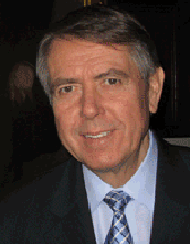
Was
in our head office in Freeport, New York as the terrible events
of 911 unfolded on global television.
I thought at that time that the attack
would change our world.
Today the air cargo business as direct result
of that day is more complicated.
New laws and regulations after 9/11 have
led to new additional internal security structures as well as our
own screening of cargo.
Right now the air cargo industry can
be viewed as having done a lot and continuing to improve security.
It would benefit all I think if international
governments could better coordinate their effort to create a more
uniform multi level approach to security.
What is needed is less confusion interpreting
rules and regulations all around. |
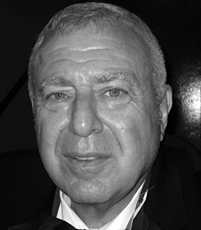
When the American Airlines aircraft
crashed into the World Trade Center, I was in Dallas preparing to go to
the airport to fly to an industry meeting on the west coast. I immediately
called the AA's Operations Center and was told of the situation.
My first thought was for my daughter, Robin, who worked on Wall Street.
Her floor to ceiling windows faced the World Trade Center and she saw the
second aircraft hit as I was talking to her. She evacuated the building
and actually saw the buildings collapse on the street. She lived in Soho
and talked to me on her cell phone as it was happening and she was walking
home.
My next calls were to military
people I know who worked in the Pentagon. Fortunately all of them were OK,
but shocked.
I knew then that the world
would change and security would be elevated to extraordinary levels, not
only with the airlines, but in many aspects of our lives.
For
years I have been pushing that the air cargo industry take on the task of
security with the same intensity that they had done for restrictive articles.
Therefore I felt it was important for the industry experts to immediately
take the first steps, after 9/11, to develop an elevated system for increased
air cargo security and thereby closely partner with the world governments
in forming a worldwide standard similar to what they did with Restricted
Articles.
I would urge the industry to
ask their governments to work with the manufacturing industry to develop
electronic devices that will safely, quickly and economically examine air
cargo.
The air cargo industry sells speed
and anything that decreases that speed will affect it. And even if speed
is decreased only by a small percentage, that will have a negative effect
on the industry. Therefore I believe the development
of these devices to maintain the speed of movement is vital to the air cargo
industry.
On September 11th, I was doing
work as Head of Valuable Cargo Services here at FRA. I got a call by a
friend who made me aware of the first aircraft crashing into the tower.
I turned on the TV and had a look to get an overview. You have to know:
I had just returned from a duty trip to NYC on September 8th and I really
like NYC a lot.
That day changed air cargo a lot.
Nothing happened the very next day, but change has been continous and
long lasting. I became Head of Cargo Security, a position we had not had
before in Lufthansa Cargo. Since 9/11, we have increased by more than
ten-fold the amount of money we spend on security, and we continue to
improve in order to stay a market leader in cargo security.
Cargo became important to the authorities,
but, sorry to say, even today I know a few big states which do not take
enough care with cargo, so there is room for improvement and for little
ol’ me to make people aware of steps that need to be done.
Lufthansa Cargo is well prepared when
it comes to security, but we need to ask and challenge ourselves every
day to be sure we are on the right track. We are ready for the challenges
that may come up in any future planning, and we are taking security as
a major and priority topic.
The industry should speak with one
voice in fighting for a worldwide, harmonized security regime. We are
logistic people and we should now how much better one single and unified
process is, in comparison to myriad different ones.
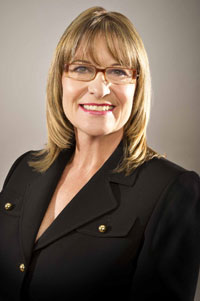
That morning I was flying to YVR for a
"final" interview . . . I had applied for the
position of Latin America regional manager for oneworld . . .
at that time oneworld was headquartered in YVR...obviously my
flight never took off . . . (was scheduled to leave DFW
at 8:30am, CST). As a side note, I am a member of AA's CARE program (Customer
Assistance Response Employee) . . . this means that while at the airport
waiting for my flight that never took off, I identified myself as a CARE
member and was immediately 'deployed' at DFW Control Centre where I worked
for 48 hours straight.
This event affected all of us . . . the
way we live, the way we think and behave . . . our jobs!
A big impact on the transportation industry including cargo, the main
impact is a significant increase in costs to both carriers and shippers.
Everyone - carriers, freight forwarders,
shippers understand the necessity of security and the investment needed
from all of us.
Air cargo is going to require a more and
deeper collaboration involving all parties.
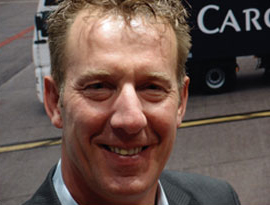
I was in my office in Nairobi working as
Managing Director for KenCargo Airlines (now Kenya Airways Cargo). The
9/11 attacks in USA hit Kenya with a major shock because of the bomb attacks
at the American embassy in Nairobi earlier. Like many other people in
Nairobi I was afraid of more attacks in the city again. As the events
unfolded in the U.S. my thoughts were that things in the aviation business
would never be the same again. Until that day I never realized how vulnerable
our industry is for terrorism.
In the late evening we had a crisis meeting
with the management team of Kenya Airways where we had to decide to ground
the entire fleet the next day until liability issues with the insurance
companies were sorted out with the government.
9/11 changed the air cargo business forever.
The procedures for delivery of export cargo as well as the handling of
transit cargo in our hubs in Saudi Arabia are very complex and will continue
to change. At Saudia Cargo we work closely with the security authorities
to ensure we are compliant with all requirements.
Security today has seen a major development
in the last 10 years. Both airlines and forwarders have made significant
investments and efforts to ensure that the air cargo industry meet the
ever changing security requirements.
As an industry we need to continue to work
with authorities on local and global level as we have done since 9/11.
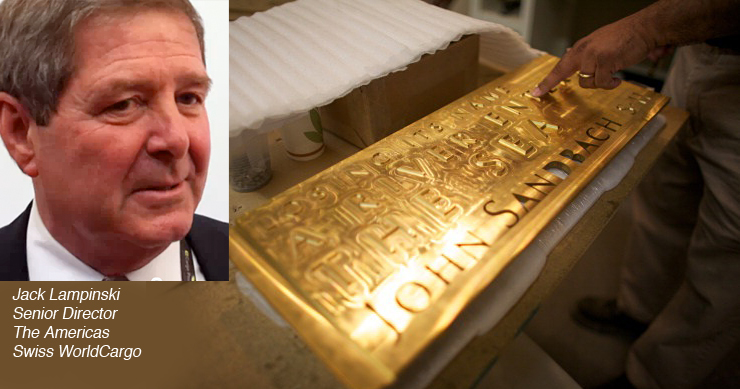
Pictured the bronze plates that are part of the WTC Memorial Pools.
The names of the nearly 3,000 individuals killed in the September 11 attacks
in New York City, Pennsylvania, and at the Pentagon, and in the February
1993 World Trade Center bombing are inscribed in the bronze parapets surrounding
the two one-acre sized pools – the former footprints of the World
Trade Center's Twin Towers. The 9/11 Memorial Museum opened May 2014.
On the morning of September 11, 2001, I
was in our JFK office (Building 151 at that time) preparing for a meeting
with our U.S. based managers. Some had flown in the night before and some
were flying that morning. Subsequently, they all had a story to tell.
My wife was at home in Rhode Island watching
the news. Shortly before 9am, she phoned to tell me that a plane had hit
one of the World Trade Center towers. I went to our main sales office,
looked out the window, and in the distance could see what appeared to
be smoke coming from the north tower. My first thought was that it was
probably a small private plane that ran into trouble. Then reality set
in. It was unthinkable! I quickly had a very sick feeling in my stomach.
In the aftermath, our business has forever
changed. Air cargo security continues to become increasingly sophisticated,
increasingly complex and increasingly expensive. The investments are enormous
and the approved technology is oftentimes short-lived. There is a critical
need for lawmakers to better listen to industry experts and for governments
to reach some common ground on acceptable security processes and procedures.
A more universal approach will further strengthen worldwide air cargo
security while minimizing the escalation of associated costs.
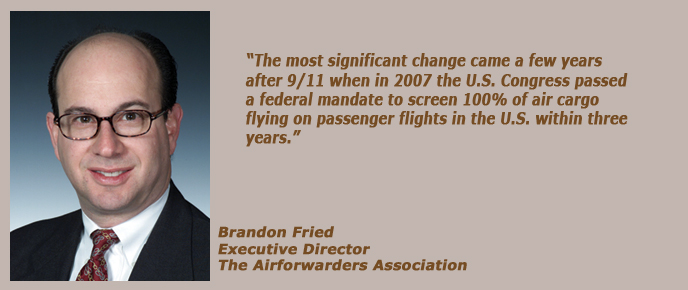
I was a forwarder serving on the Airforwarders
Association Board of Directors and had flown into Seattle from D.C. for
a meeting the night before the tragic day. My first concern of course
was for the welfare of my family and employees back in Washington since
events were rapidly unfolding.
As for the air cargo industry, my primary
concern focused on the fact that terrorists had used aviation as an effective
attack mechanism and the airfreight system could be used as well. I wondered
if those lawmakers not familiar with the business would enact legislation
that would ban shipments on passenger planes and if so, what effect would
such an initiative have on the industry and most importantly, our nation's
economy.
Following 9/11, there were many short-term
changes. In response to the attacks, improvements were introduced to address
gaps in security. It is important to note that the industry changes all
the time as it adapts to new technology, regulations and emerging threats.
The most significant change came a few years after 9/11 when in 2007;
the US Congress passed a federal mandate to screen 100% of air cargo flying
on passenger flights in the U.S. within three years.
The legislation included the Certified Cargo
Screening Program or CCSP. This is the system in place in the U.S., and
the entire supply chain is involved in screening and security from the
time the box is packed to delivery at its final destination. The industry
endured growing pains as they paid out of pocket to become certified screening
facilities in order to secure the flow of cargo.
Looking to the future, focusing on improving
aviation security and eliminating redundancies in TSA's air cargo security
policies are the issues AfA will continue to push forward. Our recommendations
are focused on:
o Harmonization
of domestic security programs
o Advancement
of national air cargo security programs with other nations
o Expansion
of the existing CBP/TSA Air Cargo Advanced Screening pilot program
o Improvement
of TSA inspector training
o Formalization
of stakeholder engagement
o Expansion
of canine detection units in pallet screening
o Fast
tracking technology research and certifications |



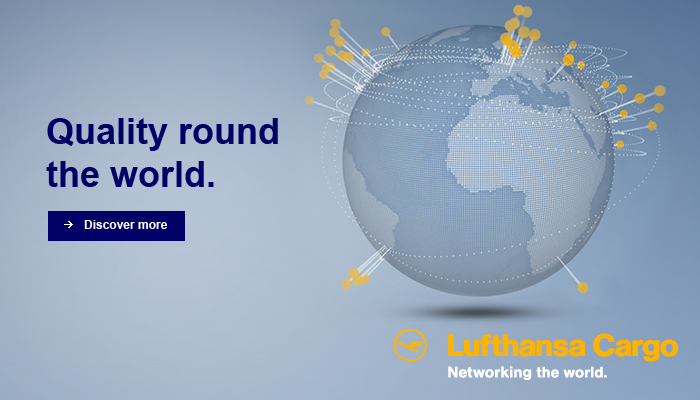

 Bill
Boesch
Bill
Boesch 